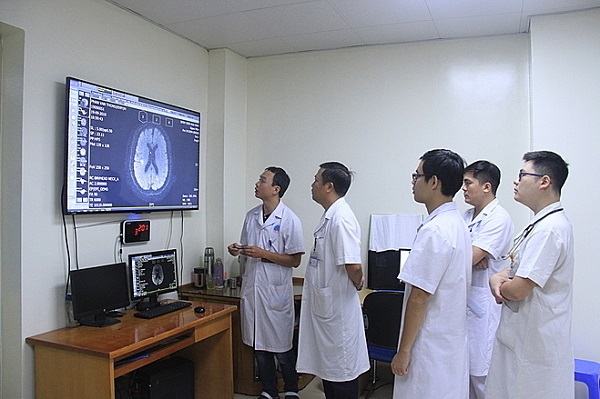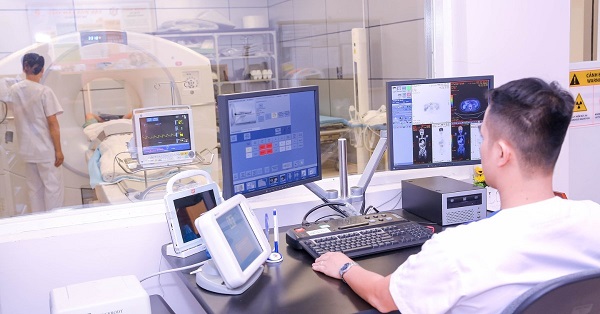Digital transformation in healthcare is becoming an important breakthrough, opening up many development opportunities for the healthcare industry in Vietnam. So what are those great benefits and are there any challenges or solutions to improve digital transformation in healthcare? We invite you to explore all of the above issues in the article below!
What is medical digital transformation?
Healthcare digital transformation is the process of applying digital technology to activities in the healthcare industry, including management, administration, patient care and scientific research. Some advanced technologies such as big data (Big Data), Internet of Things (IoT), cloud computing (Cloud Computing), Artificial Intelligence (AI), robotics, virtual reality technology (VR), … is becoming more and more popular in digital transformation of the healthcare industry. The goal of digital transformation in healthcare is to increase efficiency, reduce errors and improve the quality of medical services for the community.

Digital technology is opening a new era for the healthcare industry, helping to improve the quality of care
Benefits of medical digital transformation
For the people
Medical digital transformation helps people easily access and use health care services more conveniently. People can interact directly with doctors, receive immediate health care advice and guidance through technology applications. Thanks to linking health data between medical examination and treatment facilities, personal health monitoring and management also becomes more effective.
One of the main goals of digital transformation in healthcare is to ensure that each individual has an electronic health record to provide comprehensive and accurate information about health status to medical facilities. This not only enhances the personalization of care and treatment, but also enables faster response in emergency situations because information about medical records and medical history is retrieved immediately.
In addition, digital technologies such as linked health information systems, electronic medical records, etc. make data sharing between medical facilities easier. Thereby assisting doctors in making accurate diagnoses and providing the most suitable treatment methods for each individual.
For the Medical Industry
Digital transformation helps improve efficiency and quality in medical activitiesenabling doctors and medical staff to have easier access to the most advanced knowledge, technology and treatment methods. As a result, the health care process becomes safer and more reliable, contributing to minimizing medical errors and optimizing the medical examination and treatment process.
With electronic medical records and modern medical information management systems, patient information is stored, retrieved, and shared quickly and accurately between doctors and medical facilities. Thereby, connection and coordination between medical experts becomes more effective, supporting quick consultations, especially in complex cases that require opinions from many experts.

Medical digital transformation expands connectivity between experts, making the treatment process safer and more reliable.
For the Whole Society
Thanks to digital technologies, medical services become easier and more convenient, thereby improving people’s health comprehensively.. The application of smart management systems and electronic medical records not only minimizes unnecessary medical costs but also optimizes resources and reduces the burden on the public health system.
At the same time, digital transformation helps create a transparent and effective health system in management, supervision, and administration, contributing to improving service quality and strengthening people’s trust in the medical industry. international. Digital technology also promotes the development of new medical care models such as telemedicine and online consultation, thereby solving the challenges of geographical distance and limited access to medical services. in rural or remote areas.
Difficulties and Challenges in Medical Digital Transformation
Although much progress has been made in healthcare digital transformation, there are still significant challenges that need to be overcome such as:
- Technology infrastructure is not synchronized: The legal system and policies related to medical digital transformation are still incomplete and lack uniformity. In the context of the 4.0 Industrial Revolution having a strong impact, updating and supplementing legal regulations is necessary to promote the innovation process in the healthcare industry.
- Difficulty in data integration: The issue of connecting and integrating medical information systems between medical examination and treatment facilities, as well as between the health sector and other fields, still faces many difficulties. This hinders the creation of a comprehensive digital ecosystem so that health services can be linked conveniently and seamlessly for people.

Integrating medical data between systems is still limited
- Lack of resources: Building information technology infrastructure, as well as deploying applications and digital platforms in healthcare, requires large financial resources. For many medical facilities, especially those in remote areas, this is a big challenge in terms of investment and technology development.
- Ensure security and information confidentiality: The issue of cybersecurity in medical digital transformation is becoming increasingly urgent. Medical information is highly sensitive, so ensuring information security and preventing cyber attacks is an indispensable requirement. At the same time, people in rural areas or the elderly are also quite hesitant when it comes to accessing health services on digital platforms.
- Lack of high-tech human resources: The lack of high-quality human resources in information technology in the health sector is one of the main obstacles. There is a need for many capable experts and in-depth knowledge of digital transformation to effectively develop and operate digital health systems, while ensuring that Vietnam’s health sector can integrate and achieve success. future international standards.
Solutions for Digital Transformation of the Healthcare Industry
To overcome challenges in the healthcare digital transformation process, industry authorities need to deploy practical and synchronous solutions as soon as possible.
- Upgrade technology infrastructure: The health sector needs to complete the legal framework to promote digital transformation. It is necessary to review and supplement regulations related to exploiting, sharing and securing medical data, ensuring information security and strictly managing medical activities on digital platforms. Thereby creating a solid legal basis for the application of technology in health care.
- Standardize and manage medical data: The connection between health systems, from central to local levels along with the integration of medical data with other facilities will create a closely linked digital ecosystem. In particular, combining with relevant ministries and branches such as the Ministry of Public Security in applying the national population database will help provide more convenient and effective digital health services.

Promoting international cooperation in digital health helps Vietnam have faster access to advanced technology
- Take advantage of foreign medical resources: To solve difficulties in healthcare digital transformation in terms of resource barriers, international cooperation, research and development of advanced digital technologies can be promoted. Cooperating with countries with developed digital health systems will help Vietnam quickly access scientific and technical advances and new technology solutions, thereby promoting the process of innovation in healthcare.
- Training and developing technological human resources: It is necessary to focus on training a team of experts in information technology in health, while improving the quality of human resources to manage and operate digital health systems. This not only helps develop the domestic healthcare industry but also enhances international integration in the field of healthcare digital transformation.
Summarize
Healthcare digital transformation is an inevitable trend of the future to help the healthcare industry develop sustainably and better meet the growing needs of society. Although there are still many challenges to overcome, with determination and appropriate solutions, our country’s healthcare digital transformation will be increasingly improved and developed.
Comment Policy: We truly value your comments and appreciate the time you take to share your thoughts and feedback with us.
Note: Comments that are identified as spam or purely promotional will be removed.
To enhance your commenting experience, consider creating a Gravatar account. By adding an avatar and using the same e-mail here, your comments will feature a unique and recognizable avatar, making it easier for other members to identify you.
Please use a valid e-mail address so you can receive notifications when your comments receive replies.
